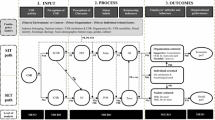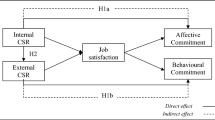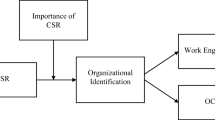Abstract
This paper reports research on the influence of corporate and individual characteristics on managers' social orientation in Germany. The results indicate that mid-level managers expressed a significantly lower social orientation than low-level managers, and that job activity did not impact social orientation. Female respondents expressed a higher social orientation than male respondents. No impact of the political system origin (former East Germany versus former West Germany) on social orientation was shown. Overall, corporate position had a significantly higher impact on social orientation than did the characteristics of the individuals surveyed.
Similar content being viewed by others
References
Aupperle, K. E., A. B. Carroll and J. D. Hatfield: 1985, 'An Empirical Examination of the Relationship between Social Responsibility and Profitability', Academy of Management Journal 28(2), 446–463.
Babbie, E.: 1992, The Practice of Social Research, 6th ed. (Wadsworth Publishing Company, Belmont).
Brislin, R. W.: 1970, 'Back–Translation for Cross–Cultural Research', Journal of Cross–Cultural Psychology 1(3), 185–216.
Carroll, A. B.: 1979, 'A Three–Dimensional Conceptual Model of Corporate Performance', Academy of Management Review 4(4), 497–506.
Carrol, A. B.: 2000, 'Ethical Challenges for Business in the New Millennium: Corporate Social Responsibility and Models of Management Morality', Business Ethics Quarterly 10(1), 33–42.
Clarkson, M. B. E.: 1988, 'Corporate Social Performance in Canada, 1976–1986', Research in Corporate Social Performance and Policy 10, 241–265.
Collins, D.: 2000, 'The Quest for Improving the Human Condition: The First 1.500 Articles Published in Journal of Business Ethics', Journal of Business Ethics 26, 1–73.
Cortina, J. M.: 1993, 'What is Coefficient Alpha? An Examination of Theory and Applications', Journal of Applied Psychology 78(1), 98–104.
Derry, R.: 1987, 'Moral Reasoning in Work–Related Conflicts', in W. C. Frederick and J. E. Post (eds.), Research in Corporate Social Performance and Policy, Vol. 9 (JAI Press, Greenwich, CT), pp. 25–49.
Donaldson, T.: 1982, Corporations and Morality (Prentice–Hall, Englewood Cliffs, NJ).
Dubinski, A. J., T. N. Ingram and W. Rudelius: 1985, 'Ethics in Industrial Selling: How Product and Service Salespeople Compare', Journal of the Academy of Marketing Science 13(1), 160–170.
Frederick, W. C. and J. Weber: 1987, 'The Values of Corporate Managers and their Critics: An Empirical Description and Normative Implications', in W. C. Frederick and J. E. Post (eds.), Research in Corporate Social Performance and Policy, Vol. 9 (JAI Press, Greenwich, CT), pp. 131–152.
Holmes, S. L.: 1976, 'Executive Perceptions of Corporate Social Responsibility', Business Horizons 19, 34–40.
Husted, B. W., J. B. Dozier, J. T. McMahon and M. W. Kattan: 1996, 'The Impact of Cross–National Carriers of Business Ethics on Attitudes about Questionable Practices and Form of Moral Reasoning', Paper presented at the annual meeting of the Academy of Management, Cincinnati, Ohio.
Ibrahim, N. A. and J. P. Angelidis: 1994, 'Effect of Board Members' Gender on Corporate Social Responsiveness Orientation', Journal of Applied Business Research 10(1), 35–40.
Ibrahim, N. A. and J. P. Angelidis: 1995, 'The Corporate Social Responsiveness Orientation of Board Members: Are There Differences between Inside and Outside Directors?', Journal of Business Ethics 14(5), 405–410.
Izraeli, D.: 1988, 'Ethical Beliefs and Behavior among Managers: A Cross Cultural Perspective', Journal of Business Ethics 7, 263–271.
Kelley, L. and A. Whatley: 1987, 'Assessing the Effects of Culture on Managerial Attitudes: A Three Culture Test', Journal of International Business Studies, 17–31.
Kidwell, J. M., R. E. Stevens and A. L. Bethke: 1987, 'Differences in Ethical Perceptions between Male and Female Managers: Myth or Reality?' Journal of Business Ethics 6, 489–493.
Kram, K. E., P. C. Yeager and G. E. Reed: 1989, 'Decisions and Dilemmas: The Ethical Dimension in the Corporate Context', in W. C. Frederick and J. E. Post (eds.), Research in Corporate Social Performance and Policy, Vol. 11 (JAI Press, Greenwich, CT), pp. 21–54.
Libby, B. and V. Agnello: 2000, 'Ethical Decision Making and the Law', Journal of Business Ethics 26, 223–232.
Loe, T., L. Ferrell and P. Mansfield: 2000, 'A Review of Empirical Studies Assessing Ethical Decision Making in Business', Journal of Business Ethics 25, 185–204.
Lowy, R. M., K. E. Aupperle and W. Acar: 1996, 'An Empirical Exploration of Social Responsibility across the Spectrum of Organizational Types', Paper presentation for the 1996 Academy of Management Meeting (Social Issues in Management Division).
Lusch, R. F. and G. R. Laczniak: 1987, 'The Evolving Marketing Concept, Competitive Intensity and Organizational Performance', Journal of the Academy of Marketing Science 15(3), 1–11.
Maignan, I.: 2001, 'Consumers' Perceptions of Corporate Social Responsibilities: A Cross–Cultural Comparison', Journal of Business Ethics 30, 57–72.
Noelle–Neumann, E.: 1993, 'Die Jahre der Einheit [The Years of Unity]', Politische Meinung 38(289), 4–14.
Ostlund, L. E.: 1977, 'Attitudes of Managers toward Corporate Social Policy', California Management Review 19(4), 35–49.
Pollack, D.: 1997, 'Das Bedürfnis nach sozialer Anerkennung [The Need of Social Recognition]', Aus Politik und Zeitgeschichte 35(13), 35–41.
Posner, B. Z. and W. H. Schmidt: 1984, 'Values and the American Manager: An Update', California Management Review 26(3), 202–216.
Randall, D. M. and A. M. Gibson: 1990, 'Methodology in Business Ethic Research: A Review and Critical Assessment', Business Ethics Quarterly 9(6), 457–471.
Ravlin, E. C. and B. M. Meglino: 1987, 'Issues in Work Values Measurement', in W. C. Frederick and J. E. Post (eds.), Research in Corporate Social Performance and Policy, Vol. 9 (JAI Press, Greenwich, CT), pp. 153–183.
Robin, D. and L. Babin: 1997, 'Making Sense of the Research on Gender and Ethics in Business: A Critical Analysis and Extension', Business Ethics Quarterly 7, pp. 61–90.
Trevino, L. K.: 1986, 'Ethical Decision Making in Organizations: A Person–Situation Interactionist Model', Academy of Management Review 11(3), 601–617.
Veen, H.: 1997, 'Innere Einheit–aber wo liegt sie? [Inner Unity–But Where Is It?]', Aus Politik und Zeitgeschichte 35(40), 22–38.
Author information
Authors and Affiliations
Rights and permissions
About this article
Cite this article
Marz, J.W., Powers, T.L. & Queisser, T. Corporate and Individual Influences on Managers' Social Orientation. Journal of Business Ethics 46, 1–11 (2003). https://doi.org/10.1023/A:1024795705173
Issue Date:
DOI: https://doi.org/10.1023/A:1024795705173




